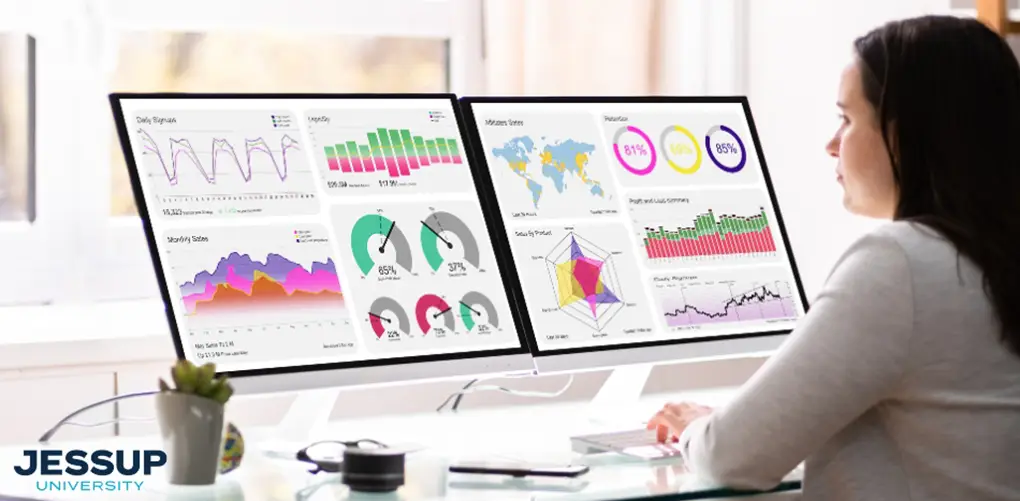
What Does a Data Analyst Do? An In-Depth Look at This Exciting Career
The age of data is upon us. As technology evolves at lightning speed, the amount of data generated daily reaches unfathomable heights. It’s estimated that 2.5 Quintilian bytes of data are produced daily. That’s a mind-boggling number with 18 zeroes.
Businesses and organizations across the globe are realizing they need to leverage data analytics and data science strategies to harness this wealth of data to transform it into powerful insights that drive intelligent business decisions.
That’s where data analysts come in. These skilled professionals take piles of messy, unorganized data and turn them into meaningful narratives that business leaders can act upon.
So, what does a data analyst do exactly? What skills and qualifications do they require? And what’s the career outlook for those looking to enter the field? Let’s analyze the fascinating role of the data analyst.
Key Takeaways
- Data analysts occupy an exciting role – translating raw datasets into insightful stories powering an organization’s next move.
- Strong technical skills in statistics, Excel, Tableau, SQL, and competent communication abilities are vital.
- Excellent career prospects with US average salaries touching $103,000, and global demand outpacing supply
- Structured training coupled with independent projects provides the best preparation.
What is Data Analytics?
Before diving further into the data analyst job duties, it’s important to understand what data analytics entails. So, what is data analytics? In short, Data Analytics examines data sets to draw conclusions about the information they contain.
It incorporates statistical analysis, data mining, predictive modeling, and machine learning techniques to gain insights, identify anomalies and trends, forecast future outcomes, and prescribe solutions.
The overarching goal is to convert raw, messy data into clear and actionable intelligence that resonates with key stakeholders in an organization. This intelligence helps leaders shape better strategies relating to operations, marketing, investments, resource allocation, and more.
For instance, an e-commerce business may leverage data analytics to understand customers’ buying behavior and preferences. Using this information, they can fine-tune their digital marketing campaigns to target high-value customer segments and better meet their needs.
A healthcare provider could apply data analytics to patient health records to determine patterns in disease progression. These discoveries can inform better prevention and treatment programs.
As you can see, data-driven decision-making is a pivotal asset across many sectors. And it’s the humble data analyst who makes this all possible.
Want To Learn Computer Science From Home?
Jessup University’s Unique Online BS in Computer Science Can Make It Happen!
What Does a Data Analyst Do?
Data analysts serve a critical function in their job description – they translate numbers, statistics, and technology into insights that drive real business impact.
Let’s explore the core responsibilities a data analyst takes on:
Gather Data, Collect Data, and Interpret Data
The first step of any data analysis process involves the all-important data collection process by identifying, gathering, and importing the relevant data. This raw data comes from various sources like websites, sensors, business applications, social media channels, and more.
Understanding what data is needed and the context behind different data sets is crucial. Analysts must comprehend the meaning of the data and assess data quality issues.
This may involve closely working with IT, sales, and marketing departments to understand their business intelligence needs.
Clean, Organize, and Validate Data
Before analysis can occur, analysts must whip raw data into shape. This data cleaning process entails:
- Fixing incomplete, inaccurate, or duplicate data
- Managing missing values
- Identifying and removing outliers
- Structuring an organized database
- Confirming overall data quality and reliability
Mastering data cleaning tools like Excel, SQL, Python, and R is critical to succeed in this step.
Mine Data for Actionable Insights
Here’s where number-crunching magic happens. Data analysts use a variety of statistical modeling, machine learning, and data visualization tools to uncover influential patterns, trends, and insights hidden within the data.
Techniques like regression analysis, predictive modeling, cluster analysis, ANOVA tests, and decision trees help analysts derive answers to pressing business questions.
Communicate Findings
An analyst’s job continues after the analysis itself. Conveying results to stakeholders in a digestible manner is crucial.
Data analysts produce interactive dashboards, dynamic reports, and captivating data visualizations – segmenting the type of data – using business intelligence tools like Tableau, Power BI, and Google Studio.
They communicate discoveries during meetings, presentations, and company events – translating technical jargon into layman’s terms. Their interpretations inform executives on where to take the business next.
Must-Have Data Analyst Job Skills

The above responsibilities highlight the diverse competencies needed to thrive as a data analyst. Let’s explore the technical and soft skills these talented professionals possess.
Technical Prowess
Data analysts live in a technology-fueled world. Here are some must-have technical skills:
- SQL – Query databases
- Excel – Organize data, analyze data, visualize data
- Tableau – Create interactive dashboards
- Python or R – Statistical analysis and modeling
- Machine learning – Recognize patterns, make predictions
- Statistics – Mean, distributions, hypothesis testing
Soft Skills Mastery
Hard skills will only get you so far. Data analysts also bank on soft skills like:
- Communication – Present insights clearly
- Storytelling – Transform data into compelling narratives
- Visualization – Design engaging charts, plots, and graphs
- Critical thinking – Approach problems analytically
- Creativity – Think outside the box
Data Analyst vs. Data Scientist Comparison
Data analysts are often confused with their hotshot counterparts, data scientists. While their domains overlap, clear differences exist between these two careers.
Data analysts gather, cleanse, analyze historical data, and uncover business insights. They tell us what happened and why it happened.
Whereas data scientists utilize advanced machine learning algorithms like neural networks to identify future trends, predict outcomes, and prescribe solutions. They focus more on using data to determine what will happen.
Both data scientists and data analysts play pivotal yet distinct roles within an organization’s data strategy. Data analysts pass cleaned data and initial discoveries to data scientists who can further enrich explorations.
Booming Career Prospects
The applications of data analytics continue to expand exponentially across sectors. This surging demand makes a data analyst career extremely appealing.
As per Harvard Business Review, data analysis emerges as the sexiest job of the 21st century. Let’s glance at the hot stats:
- There is a shortage of 151,717 people with data analytics skills in the US alone
- Data analyst job demand to grow by 35% in the next decade
- An average data analyst salary is $82,000 in the US, can reach over $100,000 in NY and SF
Calling all number crunchers! Does this instill confidence in a budding career?
Top companies like Google, Apple, and Amazon hire data analysts to monitor sales metrics, optimize marketing campaigns, boost customer experiences, and guide product development initiatives.
Even specialized domains like healthcare and financial services seek dedicated data analysts to track patient data and forecast stocks. Government agencies leverage data-driven analytics for weather predictions, crime prevention, tax planning, infrastructure decisions, and more.
Non-profits also recognize the perks of tapping data-backed insights to fundraise, plan volunteering events, and measure social impact.
With ubiquitous demand across sectors, data analysts enjoy privileged positions. Those looking to pursue an intellectually stimulating and stable career should strongly consider this route.
How to Become a Data Analyst?

Are you eager to become a data analyst? Jessup University’s Bachelor of Science in Computer Science presents an in-depth program fusing theoretical foundations with practical application. With on-campus or online learning options, students can choose their preferred format to excel.
Flexible Learning Modes for Aspiring Data Analysts
Students have the flexibility to choose between on-campus and online learning modes. Those attending in person gain from direct interactions with faculty, collaborative opportunities with peers, and engaging in various campus events structured over 15-week semesters.
Conversely, online learners benefit from the convenience of flexibly accessing course materials and faculty support over accelerated 7-week terms.
Data Analysis Focus in Curriculum
Central to both learning paths is a focus on the critical elements of data analysis. The curriculum is designed to foster a deep understanding of the data analysis process, combining specialized courses, practical projects, and a strong emphasis on ethical considerations.
Core Competencies for Newly Skilled Data Analysts
What is computer science? It’s the field of study that focuses on computation, information, and automation using computers and computational systems. It’s the backbone and foundation behind data analytics and can lead you in many directions within the tech space.
The program ensures that graduates are well-equipped with a broad range of skills relevant to data analytics. Through required and elective courses, Jessup University’s CS curriculum equips graduates with well-rounded proficiency spanning:
- Fluency in Python, R, and SQL for manipulating, analyzing, and visualizing data
- Statistical modeling, simulation, forecasting, and experimental design techniques
- Database architecture, warehousing, and large-scale distributed systems
- Supervised, unsupervised, and reinforcement machine learning algorithms
- Dashboard, report, and presentation development skills
- Integrating concepts of software engineering and computer programming with creative design
Nurturing Hard and Soft Skills in a Collaborative Environment
With an emphasis on small class sizes, Jessup University promotes a close-knit learning community where students develop both hard technical skills and soft skills, such as communication and teamwork, through real-world applications.
Preparing Ethically-Minded Data Analysts
The program equips students with technical skills and instills moral values grounded in Christian principles. This approach ensures the cultivation of responsible, professionally prepared graduates ready to embark on their career path in data analytics.
Let’s Get Started on Your Data Analytics Adventure at Jessup University
Jessup University’s Bachelor of Science in Computer Science is an ideal stepping stone for those wanting a career as a data analyst, offering a balanced mix of theoretical knowledge, practical skills, ethical grounding, and flexible learning options.
The world needs talented data analysts who understand our data-centered reality. Are you ready to fulfill this challenging yet gratifying role? If so, reach out for more information now; you could be on your way to a new, rewarding career!
Unlock Your Future in Computer Science
Explore Jessup University’s Innovative Program Today!
More Engineering & Technology Articles
-

What is Data Analytics? A Complete Overview for a Budding Data Analysis Career
What Type of Careers Use Data Analytics, What Type of Data Analytics Do Some Careers Require, What Kind of Industries Hire Data Analytics Professionals, How…
-

9 Emerging Technologies in Computer Science
The field of computer science is being propelled forward at an incredible pace by constant innovation and new technological developments. As we move further into…
-

What is the Difference Between Front End and Back End Web Development?
The internet has revolutionized modern life, providing instant access to information and transforming how we communicate, shop, work, and play. This dramatic transformation is made…
